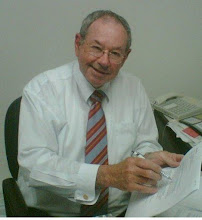Wealth Newsletter January 2008
 Our Goal - helping you from zero investment properties to ten
Our Goal - helping you from zero investment properties to tenPOSITIVE PROPERTY OUTLOOK FOR 2008
The Australian Property Outlook 2008 published by the ANZ Bank is now available.
Their comments concerning property are generally very positive for investors, e.g. “A dramatic tightening of the housing market will force already soaring house prices and rents sharply higher. By 2010 we project a record housing shortage of nearly 200,000 homes…”
They also make the interesting point that since 1984, residential property has enjoyed an extraordinary compound annual total return of 13.4%, only slightly below equities (13.8%). But when you eliminate the volatility of the stock market, housing outperforms equities by a factor of 3:1!
Of course, my opinion is that when you look at your investment gains determined by what you actually outlay – i.e. after the tenant pays half and the taxman becomes your friend – your true returns are far higher than what those indices suggest.
Let me know if you want the full ANZ Bank’s property report and I’ll email it to you.
WILL YOU HAVE ENOUGH SUPER?
When you think about it, all the hype surrounding superannuation is about the tax benefits today – but never about “will you have enough for 20-25 years of a dignified retirement?”
Well, in my view, the answer is “probably not”.
As a rule of thumb, a forty year old today would normally need to invest around 20% of gross (pre tax) income into a superannuation fund to have an income equal to 75% of their last year’s salary on retirement.
This seems to be an impossible for the average working family, wouldn’t you agree?
However with residential property investments – using my strategy of a house and land package located in an above-average growth corridor, close to a major economic zone, earning rent above the norm and in a low tax jurisdiction – with the bank becoming your business partner and the taxman becoming your friend, you can readily run the numbers and determine – depending on your assumptions - how you are likely to end up.
I can send you a newspaper article how two schoolteachers built a portfolio of 707 investment properties in 15 years. They did one in their first year, three in each of years two and three, and so on. After year ten, it just snowballed.
Of interest, these schoolteachers used the exact same strategy that I offer to my private clients. And it never got out of hand – even today the business only employs mum and dad and two daughters.
If you want a copy of this article, just email me: admin@retirelaughing.com
BAG LADY SYNDROME CAN BE TREATED
A common fear harboured by baby boomer women in North America is of becoming destitute bag ladies in old age, reported “The Canadian Financial Post” on 22 December.
The syndrome is the dread of not having enough money in retirement to maintain a modern lifestyle. At its worst, the afflicted are haunted by the idea of losing their homes and scrounging for their next meal.
The article was based on a recent poll by Allianz Life Insurance in Canada which found nearly half of the 1,925 women polled fear they'll lose their income and end up forgotten and destitute - bag ladies.
A startling 90% of those surveyed felt financially insecure. Even among high earners, a whopping 48% suffered from bag lady syndrome.
Many women reach a crisis moment when they turn 50 and take an inventory of life and career.
If you are afflicted by “bag lady syndrome” the solution is obviously to chat with me: Bernard Kelly. My mobile is 0414 778 518. I can help you explore your options.
LEAVING LESS TO THE KIDS
In the United States, the results of the Federal Reserve Board’s Survey of Consumer Finance found that fewer than half (48.4 percent) of those interviewed believed it was "important to leave an estate to heirs".
Elsewhere, the Fidelity Financial Group tested just how far the money of an average affluent retiree will travel in retirement.
In simulating an affluent retirement plan, Fidelity used a hypothetical couple retiring today with $2.2 million in liquid assets. Their spending in retirement includes standard mortgage, health and long-term-care insurance costs; and $90,000 in annual discretionary spending.
If market returns during the couple's retirement reflect historical averages, Fidelity found they are likely to exhaust their assets at around age 96.
So even $2.2million on the day you retire might not leave much for the kids when you eventually pass on.
Associated Press Newswires, 5 Dec 2007
Regards
Bernard Kelly www.retirelaughing.com mobile 0414 778 518 cell phone 61 414 778 518 admin@retirelaughing.com
PS As I don’t spend my advertising budget on traditional media, I’m able to pay you $1000 for successful referrals
PPS I would be delighted to be your personal financial coach over the next five years and share a strategy that will dramatically reduce your learning curve.


0 Comments:
Post a Comment
<< Home